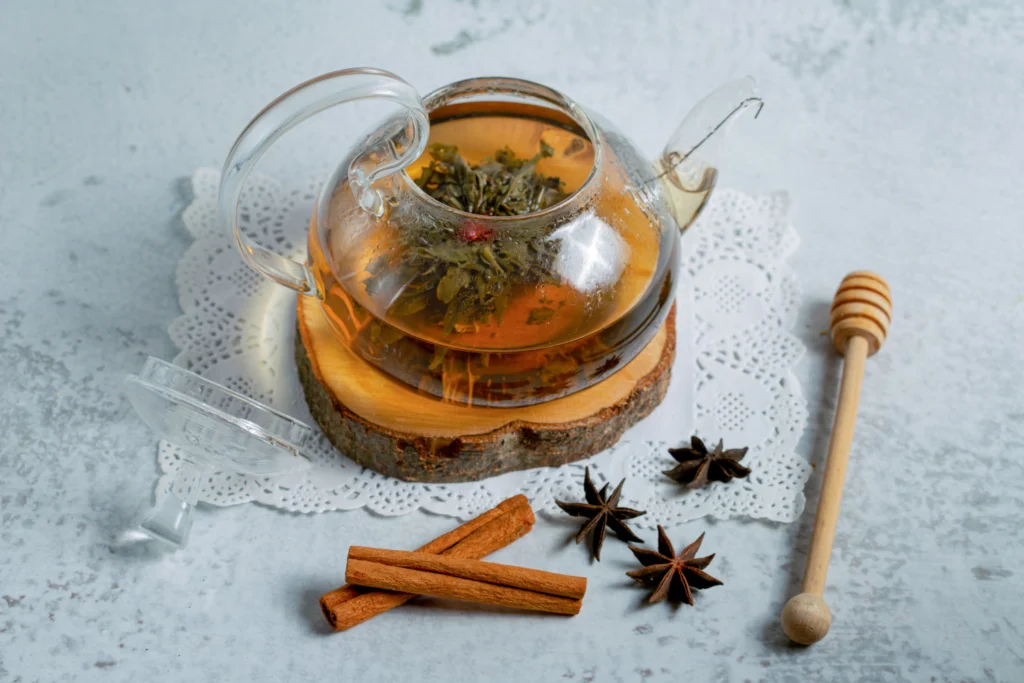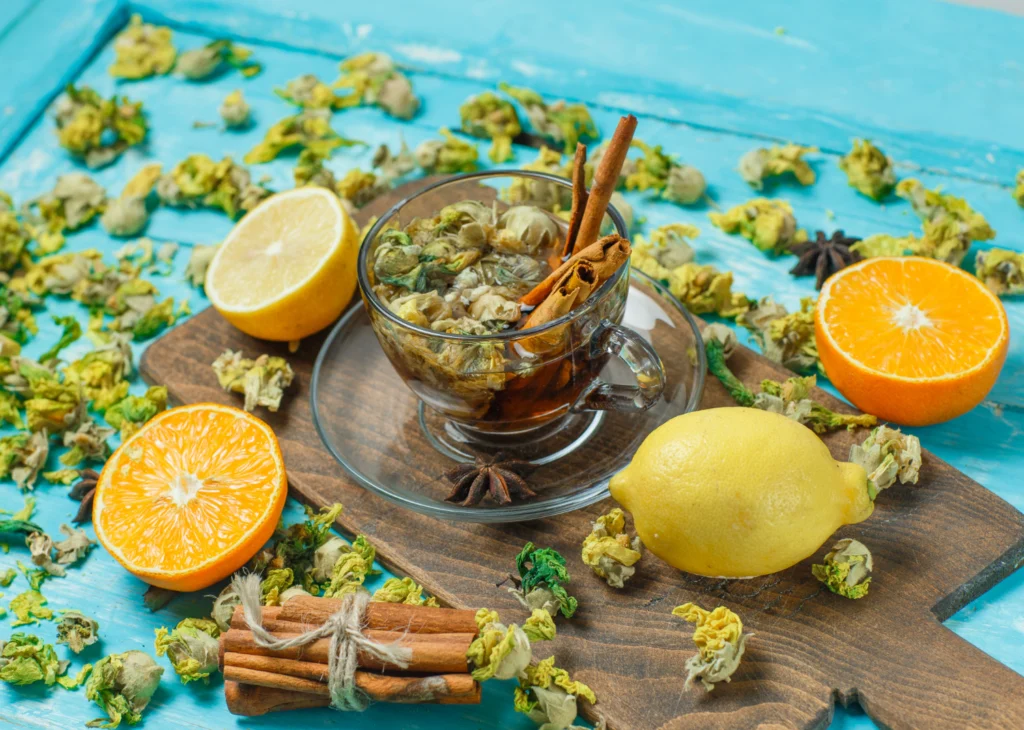Introduction
Mullein tea, an herbal infusion made from the leaves and flowers of the mullein plant (Verbascum thapsus), has seen a surge in popularity within the wellness community. Known for its potential health benefits, particularly for respiratory issues, this ancient remedy is now being rediscovered. In this article, we’ll dive into mullein tea’s benefits and side effects to help you decide which Mullein Tea right for you.
What is Mullein Tea?
Understanding the Mullein Plant (Verbascum Thapsus)
Mullein, a biennial plant native to Europe and Asia, has been used for centuries in traditional medicine, especially for respiratory ailments. Its tall, flowering stalk and soft, velvety leaves make this hardy plant recognizable.

Traditional Uses in Herbal Medicine
Historically, mullein has been a go-to remedy for colds, coughs, bronchitis, and asthma. Its leaves and flowers are typically brewed into tea or used in tinctures to relieve respiratory discomfort.
How Mullein Tea is Made
Mullein tea steers dried mullein leaf tea and flowers in hot water. It is a mildly bitter herbal infusion with a subtle, earthy aroma. Many people enhance its flavour with honey or blend it with other herbs.
Flavor and Aroma
Mullein tea offers a mild, slightly bitter flavour with earthy undertones. Its aroma is subtle and herbaceous, often compared to chamomile, but with a more robust taste.
Health Benefits of Mullein Tea
Respiratory Health
One of the most renowned benefits of mullein tea is its ability to support respiratory health. Mullein acts as an expectorant, helping to clear mucus from the lungs and ease conditions like coughs, colds, bronchitis, and asthma. This makes mullein leaf tea a valuable herbal remedy for lung health.
Anti-inflammatory Properties
Mullein tea is rich in anti-inflammatory compounds that can help reduce inflammation throughout the body. This is particularly beneficial for soothing sore throats, alleviating joint pain, and reducing other inflammatory conditions.
Digestive Support
Mullein tea also aids digestive health. Its mild astringent properties can help tone the digestive tract and relieve stomach discomfort. It may be beneficial for those experiencing indigestion or diarrhea.
Antiviral and Antibacterial Effects
Gordolobo tea, or Mullein tea, is renowned for its potent antiviral and antibacterial properties. These properties make it effective in combating infections. Mullein tea may help fight respiratory and urinary tract infections by inhibiting the growth of harmful bacteria and viruses, making it a valuable addition to natural immune support routines.
Antioxidant Properties
Mullein tea contains antioxidants that help fight oxidative stress, which is linked to aging and chronic diseases. Regular consumption of antioxidant-rich teas like mullein can support overall health and longevity.
Additional Benefits
In addition to its core benefits, mullein tea is thought to improve skin health, reduce stress, and strengthen the immune system. Although research is still evolving, many turn to mullein leaf oil and tinctures for various health needs. So, is Mullein Tea right for you?
Possible Side Effects and Risks
Common Side Effects
While mullein tea is generally safe, it may cause side effects in some individuals. Common side effects include mild allergic reactions, such as skin irritation or rashes, and digestive issues, like nausea or diarrhoea.
Less Common but Serious Side Effects
In rare cases, mullein tea may cause breathing difficulties, particularly in those with respiratory sensitivities. Other side effects may include dizziness, lightheadedness, and increased sensitivity to sunlight (photosensitivity).

Long-term Use and Safety
Long-term use of mullein tea, particularly in large amounts, may strain the liver or kidneys. It’s essential to use mullein tincture in moderation and consult a healthcare provider if you have any concerns about long-term use.
Who Should Avoid Mullein Tea?
Mullein tea may not be suitable for everyone. Pregnant or breastfeeding women, individuals with liver or kidney disorders, and those on certain medications (such as diuretics or blood pressure drugs) should avoid mullein tea unless advised otherwise by a healthcare provider.
Quality and Safety Concerns
When choosing mullein products, it’s crucial to select high-quality, organic options to avoid contamination with harmful substances like pesticides or moulds. The quality of the mullein leaves or flowers can significantly impact the safety and effectiveness of the tea.
Overdose and Toxicity
Although mullein tea is safe for most people, excessive consumption can lead to overdose and toxicity. Symptoms of mullein tea overdose include nausea, vomiting, and dizziness. To avoid these risks, follow recommended dosage guidelines and consult a healthcare provider.
How to Make Mullein Tea
Ingredients and Tools Needed
You will need dried mullein leaves or flowers, hot water, and optional sweeteners such as honey to brew mullein tea. You may also add other herbs or spices to enhance the flavor.
Brewing Instructions
Boil water over 1-2 teaspoons of dried mullein leaves or flowers.
Steep for 10-15 minutes.
Strain the tea to remove any fuzzy leaf hairs, which can be irritating if ingested.
Add sweeteners or other herbs to taste, if desired.
Dosage and Frequency
For most people, 1-2 cups of mullein tea per day is recommended. Start with a smaller amount to assess your tolerance before increasing your intake.
Mullein Tea vs. Other Herbal Teas
Comparing Herbal Teas
Mullein tea is often compared to other popular herbal teas like chamomile, peppermint, and ginger. While chamomile is known for its calming properties, peppermint for digestive support, and ginger for its anti-nausea effects, mullein tea stands out for its respiratory benefits. Each tea has unique benefits, so your choice should depend on your health needs.
Blending Mullein Tea
Mullein leaf extract can be easily blended with other herbs to enhance its benefits. For instance, combining mullein with peppermint can improve the flavour and add digestive benefits, while adding honey can help soothe a sore throat. This versatility makes mullein leaf extract a valuable addition to various herbal remedies for respiratory and throat support.
Final Thoughts: Is Mullein Tea Right for You?
Mullein tea offers a range of potential health benefits, particularly for respiratory and digestive health. However, it also comes with some risks, especially for those with certain health conditions. It’s essential to consult with a healthcare provider before adding mullein tea to your routine to ensure it’s a safe and suitable option.
FAQs About Mullein Tea
1. How do I use mullein extract drops?
Mullein extract drops are a natural remedy for respiratory issues like congestion and cough. To use them, add the recommended dose of water or juice and consume them as directed. Always consult a healthcare provider before using herbal extracts for medicinal purposes.
2. Can you smoke mullein?
Yes, mullein leaves are often used in herbal smoking blends. However, while some people use mullein to clear their lungs, consulting a healthcare professional to ensure it’s safe for your specific health condition is essential.
3. How do I dry mullein for smoking?
To dry mullein for smoking, first harvest the leaves. Lay them flat in a well-ventilated area away from direct sunlight to prevent mold. After the leaves are dehydrated, store them in an airtight container for later use.
4. Does mullein tea have caffeine?
No, mullein tea is naturally caffeine-free, making it an excellent alternative for those looking to avoid caffeine while still enjoying a warm herbal drink.
5. Where can I find mullein?
Mullein can often be found in health food stores, online herbal retailers, or even in the wild if you live in areas where it grows naturally. Be sure to correctly identify mullein before harvesting wild plants.
6. Can you smoke mullein leaf?
Yes, mullein leaf can be smoked, and it’s commonly used in herbal smoking blends. People claim it has soothing properties for the lungs, but it’s always wise to seek medical advice before using it this way.
7. Is mullein edible?
Mullein leaves and flowers are edible but are often more commonly used in teas and tinctures. The plant is known for its mild flavor and medicinal properties.
8. Where can I get mullein tea?
Mullein tea is available at many health food stores, herbal shops, and online retailers. You can also make your own by steeping dried mullein leaves or flowers in hot water.
9. How do I process mullein?
First, harvest the leaves, flowers, or roots to process mullein for use in teas, smoking blends, or tinctures. Clean and dry the plant parts, then store them in a cool, dry place until you’re ready to use them.
10. How do I clean mullein leaves?
To clean mullein leaves, rinse them gently under cold water to remove dirt and debris. Pat them dry with a clean cloth, then allow them to air-dry completely before using or storing.
11. How do I prepare mullein root?
To prepare mullein root, clean and peel it, then slice it into small pieces. You can use mullein root in teas or tinctures. To make tea, steep the root pieces in hot water for about 15 minutes. Always consult an herbalist or healthcare provider for proper dosing.
Conclusion
Mullein tea is a versatile herbal remedy with various potential health benefits, particularly for respiratory and digestive issues. However, using it responsibly and being aware of possible risks is essential. As with any herbal remedy, it’s advisable to consult with a healthcare provider before incorporating mullein tea into your daily routine. If you’ve tried mullein tea, share your experiences or questions in the comments below.


